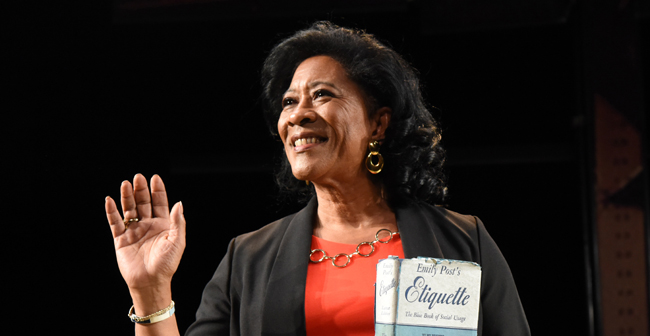Culture
 Photo: Courtesy of Mosaic Theater
Photo: Courtesy of Mosaic Theater
Mosaic Theater’s ‘Charm’ Tackles the Complexities of the LGBT+ Community
January 19, 2017 @ 12:00am
Mosaic Theater’s Charm is not a play for everyone. But it’s a story everyone should see.
Based on the true life of the Chicago LGBT icon Mama Gloria, Charm tells the story of Mama Darlena, an older transgender woman of color, and the charm school she starts for gay and trans kids at an LGBT+ youth center in the Windy City.
B’ellana Duquesne is magnificent as the lead in Mosaic Theater’s production at Atlas Performing Arts Center’s Lang Theatre, directed by Natsu Onoda Power. She charms you instantly with her drawl and smile. She exudes warmth and humor, and you know that she’s going to build you up if you’re feeling down. She is that grandma that will tell you to suck it in and sit up straight, but will cover your face in kisses and feed you until the buttons on your jeans pop. You feel this especially at the end of the first act, in a climactic scene where Mama Darlena comforts Beta, one of her students, after he reveals that he’s been beat up by a local gang for being transgender.
The play explores the complexities of the LGBT+ community across class, gender identity and race – an important facet to include, especially when most of the viewing audience may only have academic knowledge of LGBT+ issues and ideas. In one scene, D, the gender-queer director of the LGBT center, corrects Mama Darlena’s pronouns, repeating over and over that D, is not “Miss D” or a her, but just D and a them. It’s a concept that Darlena has a difficult time grasping, insisting that when she was coming of age, being called a t- – – – – was the best thing one could be called. There’s an ongoing conflict with D and Mama about whether or not the gay and trans youth in the charm class should be learning etiquette based on strict, heteronormative gender roles, something which mama doesn’t have a problem with, but may make liberal audience members cringe.
The biggest difficulties in Charm come not so much from Mosaic’s production of the play, but rather the story behind it. Written by a white, cisgender (a term meaning that your gender identity corresponds with your birth gender) man, Charm deals primarily with the story of people who are trans, Latino, black and disabled. This is a concern given the erasure of trans women of color in the history of LGBT+ activism in the U.S. The scene when we’re first introduced to the youth center kids is a bit cringeworthy, as you try to figure out how much of these characters are based on stereotypes. Thankfully, as the play continues, more about each character is revealed, dispelling this concern.
While gender-queer Duquesne plays Mama, the majority of the trans characters are played by non-trans people. This has been a point of contention with DC’s trans community since the announcement of this production. Transgender people of color, especially women, are the biggest victims of hate crimes. According to the Human Rights Campaign, over 20 trans people were victims of violent crimes in 2016. Advocates say this is because of a fear rooted in the idea that trans women are not actually women, but rather men in dresses lying about who they are, and that fear can culminate in a violent death. Although Mosaic recently held a panel discussion with members of Casa Ruby, a local organization for trans people of color, some local trans activists and voices argue that not casting trans people to play trans roles feeds into this violent idea that trans women are men. This is why Charm may not be a play for everyone.
But, it’s a story that everyone should see, especially people who are not part of the LGBT+ community. Stories about trans people are not often seen in the media, unless they’re sensationalized or violent. Charm is an important first step in changing the narrative of trans people in the eyes of others.
Catch Charm at Atlas Performing Arts Center through January 29. Tickets start at $20.
Lang Theatre at Atlas Performing Arts Center: 1333 H St. NE, DC; 202-399-7993; www.mosaictheater.org







